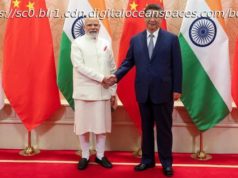He will be most senior official from China to visit in nearly two decades, as Beijing seeks to boost hi-tech ties with the nation
Vice-President Wang Qishan will travel to Israel later this month to attend a major innovation summit, the most senior Chinese official to visit in nearly two decades, as Beijing moves to broaden hi-tech ties with the Middle Eastern nation, Israeli media reported.
Wang, known as a “firefighter” and President Xi Jinping’s right-hand man, is expected to head the fourth China-Israel Innovation Committee during the three-day trip from October 22 to 25, according to the local Haaretz newspaper.
He will reportedly take part in an innovation conference to be hosted by Israeli Prime Minister Benjamin Netanyahu’s office on October 24.
Chinese and Israeli authorities declined to confirm the visit, which would be Wang’s second overseas trip since he was appointed vice-president in March.
David Baker, senior foreign press coordinator for Israel’s prime minister, said he was aware of local media reports about Wang’s visit, but referred further questions to the relevant Chinese authorities. A Chinese foreign ministry spokeswoman said she was “not aware of the situation”.
China and Israel have deepened their relationship in recent years with increased trade and investment, particularly in technology and infrastructure projects such as a Chinese company’s operation of Israel’s Haifa naval port.
Israeli officials said last year that around one-third of investments in its hi-tech industry were from mainland China and Hong Kong.
Technological collaboration has been facilitated by the joint China-Israel committee on innovation cooperation, an initiative set up in May 2014 with annual meetings held since 2015 to discuss areas where the two sides can work together.
Last year, former Chinese vice-premier Liu Yandong met Netanyahu in Beijing for the committee’s third meeting, with agreements signed on medicine, science and intellectual property.
High-profile tech investments include Chinese gaming company Giant Network’s US$4.5 billion acquisition of Israeli games developer Playtika in the artificial intelligence field, pending Chinese regulatory approval.
“Many of these companies are hi-tech start-ups in areas such as big data, AI, microchips, bio-med and agro-tech,” said Doron Ella, research associate at the Israeli Institute for National Security Studies. “The arrival of a high-ranking official such as Wang Qishan symbolises the importance of these relations both to Israel and to China.”
E-commerce giant Alibaba Group, owner of the South China Morning Post, also invested US$26.4 million in Israeli database analytics developer SQream in May. The company’s co-founder and executive chairman Jack Ma will also attend the prime minister’s innovation conference, following a visit to the country in May when he met Netanyahu.
Ella said Israel could play a “critical role” in advancing Beijing’s “Made in China 2025” initiative but it needed to be careful given China’s intensifying trade war with the United States, a key ally for Israel. The strategic plan to guide the country’s industrial modernisation – including the substitution of foreign technology with innovation developed on the mainland – is seen by Washington as a means of enabling Beijing to “steal” US technology.
“For now, Israel is trying to stay neutral in this trade war, although China sees Israel as some kind of replacement for investments in hi-tech sectors which are slowly closing down on it in the Silicon Valley,” Ella said. “Israel wishes to keep its relations with China on good terms. However, it can’t afford having its relations with the US deteriorate on any level.”
Israel also has concerns about Beijing’s relationships with its adversaries, such as Iran, but has not let them affect its public policy for now, he said.






